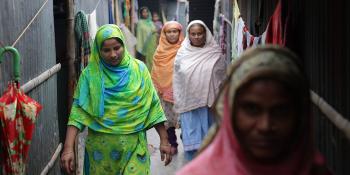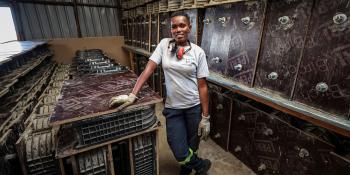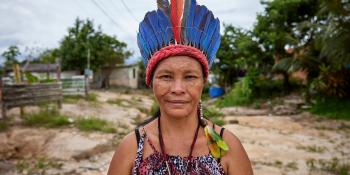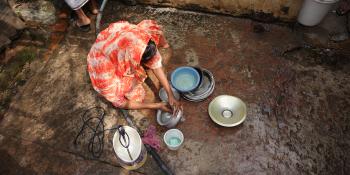By increasing access to adequate housing in informal settlements, the Home Equals campaign improves health, increases safety and security, and creates a brighter future for individuals and communities.
Improved physical and mental health improves people’s quality of life and allows them to participate fully in society.
Currently, about one-fourth of people worldwide lack safe drinking water in their homes, and nearly half lack adequate sanitation facilities, according to a United Nations report. Improving basic services exponentially boosts health outcomes and helps reduce social inequalities. Without these services, people in informal settlements lack the living environments necessary for them to thrive.
Just how big of a difference can adequate housing make for health?
A study in Mexico by the World Bank and University of California, Berkeley (pdf) confirmed multiple health benefits for families who replaced their dirt floors with concrete.
- Children in these households showed reductions in parasitic infections, diarrhea and anemia, as well as a 36% to 96% improvement in cognitive development.
- Parents likewise showed an uptick in housing satisfaction and a significant drop in depression and stress levels.
Moreover, equitable access to adequate housing in informal settlements can:
- increase life expectancy up to 4% around the world, adding 2.4 years of life on average.
- prevent more than 730,000 deaths annually, a number that is higher than lives saved by eradicating malaria globally.
In this way, policies that expand basic services to informal settlements are literally lifesaving, ensuring a healthier and brighter future for inhabitants.
Adequate housing allows people to increase living space and add rooms incrementally as their families grow. It also protects people from hazards and natural disasters, which in many parts of the world are occurring more frequently due to climate change. In short, home equals safety and security.
One critical aspect of adequate housing is tenure security. For people living in informal settlements, the threat of eviction due to a lack of property rights makes it impossible to build for a safe and secure future. This situation deprives residents, especially women and other vulnerable groups, of even the most basic physical, economic and psychological protections.
Another challenge is that informal settlements are often built in unsafe areas – on polluted sites, or in areas prone to flooding, drought or other hazards. These threats have been amplified by the impacts of climate change, including more frequent and intense weather-related events. When disasters occur, the lack of land titles or formal occupancy makes it harder for families to rebuild.
Just how big of a difference can adequate housing make for safety and security?
We know that improved tenure security and safer housing can help reduce poverty and improve living standards. At Habitat, we’ve seen this time and again, including in Honduras, where more equitable housing policies resulted in better conditions for families across the country.
To make homes safer and more secure, they can be improved or rebuilt to better withstand the impacts of climate change. People in informal settlements can benefit from efforts to decrease the risk of eviction or displacement, giving them a chance to focus on the future.
Policies that promote tenure security and help communities become more resilient can help families be more safe, secure and ready when disasters strike.
When homes are located near employers, and when basic infrastructure like roads and bridges enable people to get to work easily, participation in the formal economy increases. This provides opportunities for workers to develop their skills and grow their careers. Secure homes also allow entrepreneurs to start new businesses, creating new jobs.
Without access to adequate housing, social and economic inequities grow deeper and more ingrained. Unless progress is made, more than a billion people worldwide will face disadvantages for years to come, causing inequality to grow. Marginalized people, including women, minority groups and the elderly, experience the highest levels of housing inequity and discrimination. Changing housing policy is crucial to creating a society that is fairer for all, both now and in the future.
Just how big of a difference can adequate housing make for one’s future?
The economic benefits of equitable access to adequate housing are significant:
- At the national level, equitable access to adequate housing in informal settlements can generate a direct impact of as much as 10.5% economic growth.
The educational benefits are impressive as well:
- Expected years of schooling in some countries may increase by as much as 28% because of access to adequate housing in informal settlements.
- As many as 41.6 million children and youth could be enrolled in primary and secondary schools globally due to housing improvements in these communities.
To see more data and evidence about the impact possibilities of improving housing in informal settlements, view our in-depth report.






